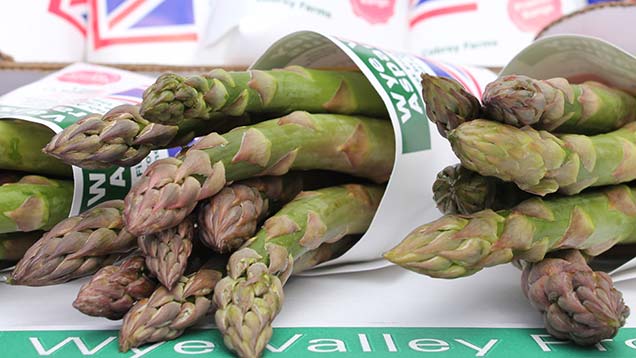UK asparagus production ‘under threat’ from pesticide laws

Britain’s biggest asparagus grower believes producing the crop in the UK will become “almost impossible” if the EU passes laws to ban key crop protection products.
EU policymakers are seeking to implement new legislation on endocrine disruptor chemicals (EDCs), which could result in the loss of key products. A consultation on the proposals for an EDC definition closed last week.
Farm facts
Cobrey Farms, Ross-on Wye, Herefordshire
- Total farm size is 1,200ha
- 500ha devoted to asparagus production
- The asparagus operation supports 12 other farmers and more than 1,000 employees
- Farm supplies asparagus to all UK supermarkets, except Waitrose
- Rhubarb, blueberries, potatoes and and combinable crops are also grown.
Herefordshire grower John Chinn (pictured below) farms 500ha of asparagus at Cobrey Farms, Ross on Wye, Herefordshire, equivalent to about 25% of the country’s total asparagus production.
Mr Chinn said further reductions to the list of permitted active ingredients would jeopardise current British asparagus production and curtail the expansion so urgently needed to replace imports from Peru.
See also: EU pesticide crackdown ‘must be based on sound science’
“It could make asparagus production in the UK impossible and leave us in a crazy situation where we are importing asparagus from countries such as Peru and Mexico, which has been produced using chemicals banned in the EU,” he explained.
“Added to this is the effect it would have on the carbon footprint as each kilogramme of asparagus flown from Peru to the UK generates 10kg of carbon dioxide.”
An independent report by farm consultant Andersons has warned up to 40 active substances are at risk of being lost, which could result in a yield penalty of 50%, depending on the crop.
Asparagus is considered one of nature’s “superfoods” being a particularly rich source of folic acid, minerals and vitamins.
It is being enjoyed in ever increasing quantities in the UK. Ten years ago, it was eaten by just 3% of the population, but that figure now stands at 17%.
However, in the UK it is grown on just 2,000ha and the marketplace is so undersupplied that some 40% of all asparagus consumed during the UK season is imported – mainly from Peru.
A lack of crop protection products and the unreliable British weather is already having a significant effect on UK asparagus growers.
The current paucity of permitted active ingredients for weed and disease control is resulting in the evolution of resistant weeds and fungal disease.
For many, the economics of asparagus production in the UK are already difficult due to the very restricted range of chemistry available.
But the Chinns, as well as thousands of other UK growers, are now threatened with further reductions in the range of chemistry permitted for use in the UK.
Mr Chinn said: “In terms of herbicides, the loss of metribuzin, linuron or pendimethalin would make things very difficult, and particularly linuron, given current metribuzin resistance problems in groundsel.
“It is not commercially viable to grow asparagus as an outdoor crop in the UK without effective residual herbicides.
“Mechanical cultivation damages the crop, shortens economic life and provides ineffective weed control compared to residual herbicides.”
Available replacements for these herbicides, which could be classified as endocrine disruptors, are not sufficient to provide acceptable levels of weed control in asparagus, added Mr Chinn.
Without more new herbicide approvals in asparagus, the continued availability of these herbicides is absolutely necessary for continued UK production.
Mr Chinn said current approvals for the fungicides difenconazole and chlorothalonil were “crucial to continued cost-effective control of foliar disease in asparagus”.
He added: “The loss of these would significantly increase costs and decrease competitiveness while also increasing the risk of developing fungicide-resistant stemphylium.
“The overuse of boscalid and pyraclostrobin has led to resistant stemphylium in European asparagus. Boscalid and pyraclostrobin would be the most likely substitute for the above.
“The neonicotinoid insecticide thiacloprid is crucial for continued effective control of the common asparagus beetle [Crioceris asparagi], the most serious pest of asparagus in the UK.
“The insecticide cypermethrin, while insufficient to control this pest alone, provides an alternative mode of action that can be used in sequence with thiacloprid to decrease the risk of neonicotinoid resistance in C asparagi while providing additional control of secondary asparagus pests such as aphids and thrips.”
Mr Chinn said the loss of either of these insecticides would be “challenging”, but the loss of thiacloprid would have a “much more serious negative effect” on continued cost-effective asparagus production in the UK.
“There is no effective cultural control for asparagus beetle and control currently relies entirely on chemicals,” he explained.
Mr Chinn called on EU policymakers to offer an “even-handed” solution to the endocrine disruptor debate, to “protect local jobs and to help save the planet from the vagaries of climate change”.





